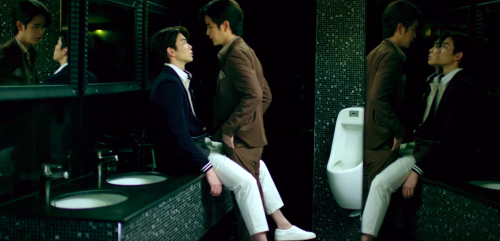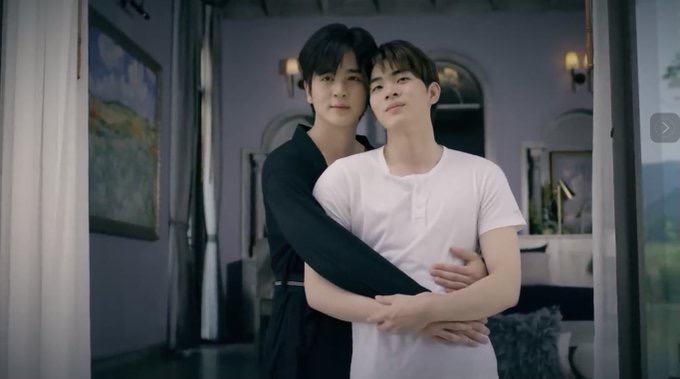Unforgotten Night: The Mafia BL We Didn’t Know We Needed
Kim and Kamol meet when they are both at a low point in their sexual lives and use a night of instant gratification to put their separate disappointments behind them.
Neither expects to enjoy the encounter as much as they do but only one decides to pursue the other for an encore.
Even when the reluctant party - Kim, eventually decides the best way to get over one man may be to regularly get under another, they each have to come to terms with their individual insecurities which unfold in a series of consequential conflicts over 12 briskly-paced episodes, which call for mature soul-searching, negotiation of boundaries, and making life-changing compromises.

One of the things about living in a global media environment dominated by western world views is that it can limit our ability to imagine a world where that view of human relations isn’t the dominant paradigm.
Transgressive art that queers a female gaze to help expand our aspirations of what is possible beyond the socially and sexually normative is necessarily contested terrain.
That’s why it should come as no surprise to the many millions who have enjoyed Unforgotten Night The Series, that the social media commentary for this BL series became a battlefield among western fans.
The largely Anglophone battle was between outdated ideas typically used in the fight-back against the de-dentering of entrenched homonormative western scripts, and more aspirational, queer Asian views about power, eroticism and masculinity.
If you are an international viewer who viewed this series through that lens this review is for you.
In a global queer media environment where $100M American LGBT movies are falling flat even among gay audiences Unforgotten Night is a queer, Asian love story that engages multiple demographics from the start to the satisfying and inspiring finish.
The Setup

Kim, a 25 year old accountant, wants to heal a broken heart in the embrace of an enticing stranger if only for one night.
Kamol a 36 year old mafia kingpin is frustrated that despite all his resources, his relentless search for the ideal sex partner has been fruitless.
In classic romance tropes terms this is how our forced proximity tale begins.
Kim and Kamol meet when they are both at a low point in their sexual lives and use a night of instant gratification to put their separate disappointments behind them.
Neither expects to enjoy the encounter as much as they do but only one decides to pursue the other for an encore.
Even when the reluctant party - Kim, eventually decides the best way to get over one man may be to regularly get under another, they each have to come to terms with their individual insecurities which unfold in a series of consequential conflicts over 12 briskly-paced episodes, which call for mature soul-searching, negotiation of boundaries, and making life-changing compromises.
The Central Conflict
Queer storytelling is essentially about deconstructing power. Gender is a system of power based on sex differences, so in order to challenge masculinity norms one must inevitably engage with naked power.
Who has it, who doesn’t, what does it mean in context, and how can love still be the end result of relationships that begin with significant hierarchical difference, are subjects Asian BL has been taking on for decades.
From the start Kamol is aware of the significant power imbalance between he and Kim.
That is the main reason he is overly confident he will win in the battle of wills to bring Kim into his life as the sex partner of his dreams.
Kamol is bigger, older, stronger, richer, wiser in the ways of the world, and has an arsenal of proxies for violence at his disposal, that together act as an implied threat to Kim.

They each have profound insecurities; Kim that he will be romantically abandoned as happened painfully with Day and that his rival Cherry warns will happen again; while Kamol is burdened by the anxiety that his high-risk career puts him in danger every day of losing Kim just as he finally found the man of his dreams.
Even if they are to sustain the sexual connection that draws them together these psychological barriers are in the way, compounding the social inequalities that antagonise their coupledom outside the bedroom.
At the point where Kim agrees to move into Kamol’s mansion, it’s not entirely due to Kamol’s persistence but also because Kim becomes aware their time spent together is the only thing that alleviates his heartbreak, so the consent starts out as only partially coerced.
While for most BLs the issue of consent is a purely sexual one and hence its consummation is usually the highpoint of the series, in Unforgotten Night the narrative journey which opens with consensual sex, is instead towards consent to an intimate relationship in the fullest sense of the term.

There have been criticisms that for a BDSM series there were surprisingly few BDSM scenes, but as follows the central theme of the narrative, the sex was already a settled matter between the two and therefore forms the backdrop rather than being instrumental to the plot.
It also feels unneceary to say but enough people forget that UN was created for a mainstream Thai TV channel release with a backup on Youtube both of which imply family audiences as the targets.
With the sex as a stable site of bonding between Kamol and Kim, the main focus of the romance conflict is therefore centered on the problematique of whether a relationship founded in sexual compatibility could survive the violent, unequal and dangerous social context it is embedded in.
One of the transformative elements I enjoyed most about this BL is that the more socially dominant man in the main couple is purposely not cast in the Hollywood fantasy version of mafia kingpin – muscular, square-jawed, brutish and the hegemonic wet-dream of the white, western imaginary but one which doesn’t bear out empirically even in American or European reality.
It’s a fantasy because in Hollywood depictions of the mafia are not allowed to look like actual existing mafia personalities but rather reflect that society’s ideas of an amalgamation and projection of the hegemonic markers of white, rugged, individualist masculinity.
This stereotype in US gangster films hasn’t been updated in decades and I for one am glad to see an Asian BL again lead the way in deconstructing visual notions of power and masculinity.
Kamol and the Imagined Mafia Aesthetic

There was far more realism in the way the Asian creators refused to use makeup to make his features more hyper masculine, than an actual mafia man at the top of his game would look, which is like any other wealthy businessman or powerful politician.
Men whose face and bodies confirm they’ve devoted a lifetime to using brawn to get ahead, rarely reach the top of any lucrative financial or commercial enterprise in society. Instead those men are more likely to die young or grow old in prison or in poverty, than be found surveying all their territory from penthouses or private jets.
Yoon Pusanat (Kamol) is a consummate performer in this role. He plays a vastly different character than all his other school boy or light-hearted comedic roles yet does so convincingly, projecting the deadly gravitas of a young mafia boss in his 30s, walking, changing his speaking voice and using his body like a tightly coiled spring.
Like a gangster who is used to deliberating every move and is aware of his own power, Yoon does not break his mafia persona even once in 12 episodes.
This is why he never shouts or gets hysterical in the chess game he plays with rivals, government officials and authorities as we have seen in other more poorly conceived Thai mafia BLs. Rather, it is always the hallmark of inevitable losers - in this series Danai, who rant hysterically, are reactive, and perpetually lose their cool in the psychological tightrope that is organized crime.
Yoon’s Kamol plays dangerous games in the high-stakes black economy but beats his rivals at it primarily through dominating them with his brains rather than his fists, mentally out-strategising them, while deploying violence as a last, not first resort.

In keeping with reality in mafia hierarchies, Kamol’s facial looks are as irrelevant to climbing the treacherous ladder of organised crime as it was for one of the deadliest and most prominent mobsters in history, the American gangster Baby Face Nelson.
In all his mafia challenges he is consistently the epitome of cool-and-deadly, taking each new challenge firmly in stride. In Yoon’s masterful portrayal of Kamol we see him lose his cool only twice, not in his work space where he is in full command of his violent terrain, but both times it’s pertaining to the unfamiliar territory of matters of the heart where he encounters his biggest insecurity – losing Kim.
By the time we reach episode 10 Kim and Kamol, have eliminated their main conflicts and are fully dedicated to loving and supporting each other having exposed their most vulnerable selves on the vacation.
Kamol is still a criminal mastermind preparing for that last big deal before going “straight” but only in the business sense of course.
He still traffics in violence, mostly via his proxies, but we see that he’s more discriminating about its use even in the face of extreme provocation from Danil.
This is a foundational message of classic BL philosophy. That while the world around us may be vicious, deadly and unjust there is still capacity for men to express masculinity that is generous, full of care and is gentle to people they love.
The other mainstay of BL storytelling is the way toxic masculinity is inscribed in the personas and actions of either the protagonist prior to his metamorphosis, or played out via the male villains especially those who appear to reflect conventional, normative masculinity. Hegemonic masculinity is toxic masculinity.

What is being Consented to
How consent is dealt with in this series is appreciably less superficial that we have seen in many previous Thai BLs. On the Asian BL scene it is Danmei - Chinese BL, that is best known for consistently engaging in themes of complex morality that challenge both the protagonists and the viewer to see the world through mud-tinted glasses.
At the point Kim capitulates and agrees to become Kamol’s live-in lover, that consent wasn’t given entirely willingly, so it is somewhat dubious. In more usual circumstances Kim might not have agreed to move in if he wasn’t manipulated by being in emotional extremis. Always the strategic opportunist, Kamol takes full advantage of that.
But by consistently practicing the actions that would entice Kim to his side, honesty, kindness, communication, trust, Kamol himself develops the emotional intelligence to love and be loved in turn.
So that rather than cleverly binding Kim to him through sexual dependency, his original goal, Kamol ultimately frees himself. From an object of sex Kim becomes the subject of Kamol’s love.

The man Kamol becomes by the last episode is the man Kim freely consents to being with as a life partner. By the time they declare their mutual intentions their relationship is no longer one of sexually dominance and submission, that part is confined to kink games in the bedroom.
By this time the more powerful man has done the work to reduce their power gap, Kim and Kamol reach the emotional climax that is the pinnacle of the series.
Love is not assumed ‘til all the ingredients bell hooks lists as constitutive of love between equals are fully in play: care, commitment, knowledge, responsibility, respect and trust, are clear and present.

Unforgotten Night puts a new twist on BL storytelling with a classic beauty and the beast forced proximity au that is authentically Thai, told very much through a transgressive queer gaze and focused on eroticised intimacy rather than sexualised shock value, to create emotional responses in the viewer.
In a customary straight version of this tale, the less powerful partner typically the heroine, adapts herself to the preferences and ways of the hero til her interests are aligned with that of the more powerful partner and the patriarchal happy ever after is achieved. This is the more regressive choice made by Kinn Porsche series.
With its progressive queer politics, and subversive visual choices Unforgotten Night manages to do what no other BL about a mafia kingpin in love manages to do since HIStory3:Trapped; combine dramatic tension with homoerotic intensity in a productive balance that makes it an exhilarating BL to watch up to its satisfying climax.
Post a comment